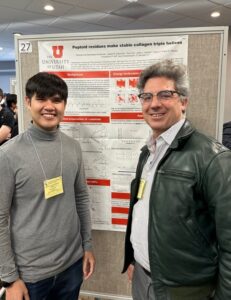Congratulations Sake!
Utah’s Biomedical Engineering program actively encourages opportunities to collaborate with other institutions, departments, and collaborators. BME faculty Michael Yu, also adjunct professor in Molecular Pharmaceutics on campus, mentors Pharmaceutics PhD student, Pahweenvaj Ratnatilakanabhuket (Sake) in a cross-disciplinary project developing collagen targeted drugs for fibrotic disease. These collaborations train students with broad skill sets and research perspectives relevant to a 21st century career in medtech and pharma. Utah’s BME/Pharmaceutics partnership has produced dozens of co-mentored students with this competence.
If you’ve been considering attending one of the over 500 Gordon Research Conferences and Seminars, make sure you read about Sake’s amazing experience below!

It was a wonderful experience to attend the 2022 Gordon Research Seminar (GRS) and Gordon Research Conference (GRC) Chemistry and Biology of Peptides from Oct 29th – Nov 4th at Oxnard, CA. I presented a part of my research in the poster session at this conference. My presentation title was “Peptoid residues make stabile collagen triple helices”. Briefly, this work demonstrates that the peptoid residues could be incorporated into the GlyXaaYaa motif of collagen, and most of them did not disrupt the triple helical structure of collagen mimetic peptide. We are interested in incorporating peptoids into collagen mimetic peptides because they are more metabolically stable than amino acids and have diverse side chains. However, triple helical propensities of peptoid residues in the Xaa and Yaa positions are different as evidenced by melting temperatures of host peptides containing guest peptoids. Our experimental and computational data show that peptoids’ dihedral angles (backbone and side chain) in the Xaa and Yaa positions are largely different. We speculate that this results from the differences in the nearby residues and spaces around the Xaa and Yaa position. We are currently utilizing the findings from this work to engineer novel collagen peptidomimetics for diagnosis and therapeutic applications.
The GRS is an associated meeting of the GRC, where graduate students, postdocs, and early career scientists present, exchange, and discuss research in peptide science. The conference program started from the GRS meeting in the first two days, followed by GRC. The conference topics ranged from the chemistry of peptide synthesis, peptide biosynthesis, artificial intelligence in peptide discovery and design, tools and technologies for the discovery and studying peptides, peptide materials, green chemistry, biological activities of peptides, and translations of peptides as therapeutics. The work presented at the GRS and GRC venues was cutting-edge and pre-publication, ensuring that the attendees learned the latest research in the field. In addition, the attendees were from both academia and industry. One research area that was interesting to me was the use of mRNA display technology for bioactive peptide discovery. This technology can generate very large peptide libraries (1013 variants) and incorporate either natural or unnatural amino acids into peptides. This technology is being exploited by (bio)pharmaceutical companies to develop new peptide therapeutics. Besides the research, the conference was very inclusive, warm-welcoming, and diverse. I met people from different countries, races, backgrounds, and genders. I met a lot of people in the field and have connected with many of them, either from academia or industry. I received several useful comments and suggestions for my work and career path from many attendees. I highly recommend that other students and postdocs go to any GRC conference that fits their research. There are hundreds of GRC conferences you can find on their website (https://www.grc.org/). They are good places to build your networks and find a potential employer once you graduate or finish postdoctoral training.
–
Sake
_________________________________
Pahweenvaj Ratnatilaka Na Bhuket, R.Ph.
Ph.D. student in Molecular Pharmaceutics
Michael Yu Group
University of Utah, UT, USA